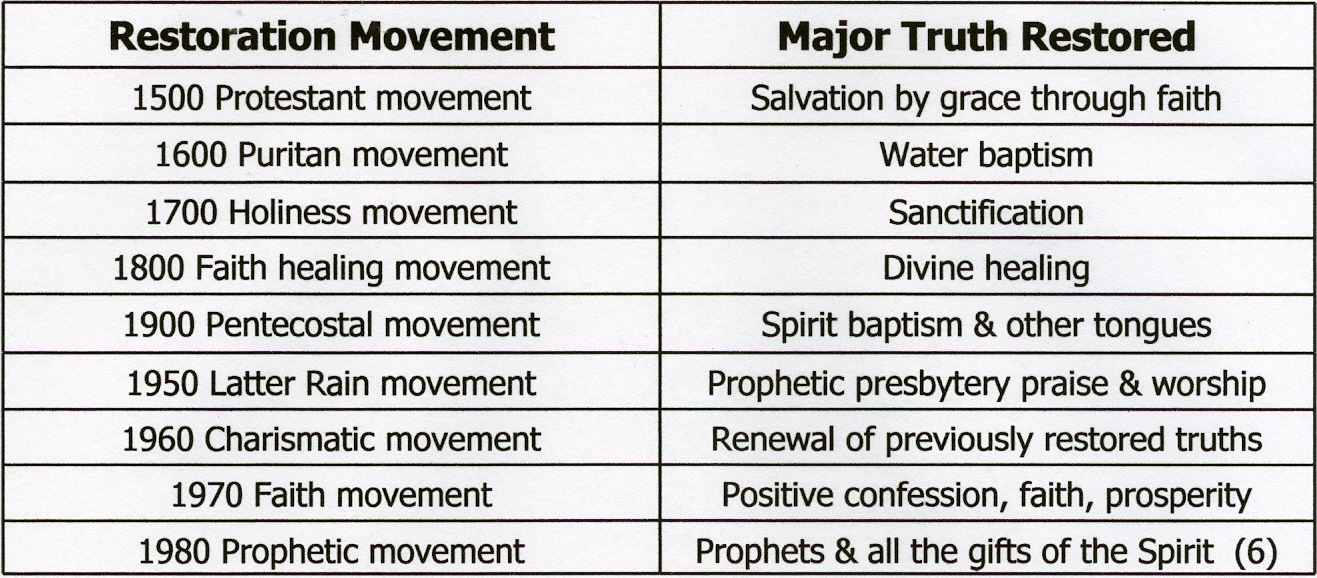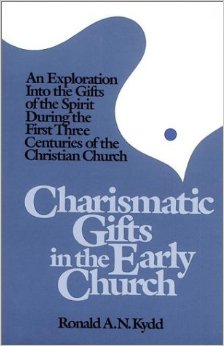If one is going to look for post-biblical origins of Word-Faith teaching then it is best to start with the church fathers. Many of them taught mountain moving faith, miracles, and authority over the devil. As one author notes:
"Fearing the Lord," says Hermas, "you will have dominion over the Devil; for there is no power in him." This view of Hermas may be said to have been entertained by all the great minds of the Church in all subsequent periods.
So, if one is interested in origins, going to the CFs will prove helpful.
Very, very true what it is that you noted - as this is something many in the WOF Movement (when I was growing up in it) noted as it concerns the reality of history alone and seeing what the Early Church emphasized - be it with miracles honoring Christ, the concept of God's authority for His saints or walking in faith and a hsot of many other things...as discussed before in the thread entitled
Is there a GENUINE argument against WoF? (WOF ONLY) and
Joseph Prince interpretation of 1 John 1:9 and even
Sabbath rest, tithes and such (as it concerns the concepts of sowing/reaping and tithing - emphasized in the Faith Movement). On the Church Fathers, one can consider Irenaues as it concerns the Power of God...
On Book 2, Chapter 32, section 4
Those who are truly his disciples, receive grace from him,....perform works in his name, in order to promote the welfare of others, according to the gift that each one has received from Him. Some truly and certinally cast out devils. The result is that those who have been cleansed from evil spirits frequently both believe and join themselves to the church...still others heal the sick by laying their hands upon them, and the sick are made whole. What is more, as I have said, even the dead have been raised up and remained among us for years. What more can I say? it is not possible to name the number of gifts which the church throughout the whole world has received from God, in the name of Jesus Christ. irenaeus (c180, e/w) 1.409, Irenaues against heresies
More from Ireneaus in Book 4, Chapter 11:
For as God is always the same, so also man, when found in
God, shall always go on towards God. For neither does God at any time cease to confer benefits upon, or to enrich man; nor does man ever cease from receiving the benefits, and being enriched by
God. For the receptacle of His goodness, and the instrument of His glorification, is the man who is grateful to Him that made him; and again, the receptacle of His just judgment is the ungrateful man, who both despises his Maker and is not subject to His Word; who has promised that He will give very much to those always bringing forth fruit, and more [and more] to those who have the Lord's money. Well done, He says, good and faithful servant: because you have been faithful in little, I will appoint you over many things; enter into the
joy of your Lord.
Matthew 25:21, etc. The Lord Himself thus promises very much.
If, therefore, in the present time also, God, knowing the number of those who will not believe, since He foreknows all things, has given them over to unbelief, and turned away His face from men of this stamp, leaving them in the darkness which they have themselves chosen for themselves, what is there wonderful if He did also at that time give over to their unbelief,
Pharaoh, who never would have
believed, along with those who were with him? As the Word spoke to
Moses from the bush: And I am sure that the king of
Egypt will not let you go, unless by a mighty hand.
Exodus 3:19 And for the reason that the Lord spoke in
parables, and brought blindness upon
Israel, that seeing they might not see, since He
knew the [spirit of] unbelief in them, for the same reason did He harden
Pharaoh's heart; in order that, while seeing that it was the finger of God which led forth the people, he might not
believe, but be precipitated into a sea of unbelief, resting in the notion that the exit of these [
Israelites] was accomplished by magical power, and that it was not by the operation of
God that the
Red Sea afforded a passage to the people, but that this occurred by merely natural causes
CHURCH FATHERS: Against Heresies, IV.29 (St. Irenaeus)
Something to keep in mind when it comes to realizing how things did not just die out within the early centuries of the Church.
And as it concerns authority, I am reminded of one story that comes to mind involving one of the Desert Fathers playing with snakes/dangerous beasts like they were pets (specifically, one of the Fathers who used to tell of a certain Abba Paul, from lower Egypt, who lived in the Thebaid and who used to take various kinds of snakes in his hands) - and yet when questioned on it, he said it was how the Lord designed it since animals respond to believers who know their authority and help animals to see their own authority (more shared
here and
here in
In the Heart of the Desert: The Spirituality of the Desert Fathers ... - Page 85
As said in one book discussing the matter:
When it comes to relating to the animals, there is an abundance of information about the connection that the desert dwellers enjoyed with their co-inhabitants of the desert.
One of the Fathers used to tell of a certain Abba Paul, from lower Egypt, who lived in the Thebaid. He used to take various kinds of snakes in his hands… . The brothers made a prostration before him, asking: “Tell us what you have done to receive this grace.” He said: “Forgive me, Fathers, but if someone acquires purity, then everything is in submission to that person, just as it was for Adam when he was in paradise before the transgression of the commandment.”
Abba Antony also said: “Obedience with abstinence gives people authority even over wild beasts.”
Antony knew the truth of this statement. He had persuaded the animals in his region to live at peace with him and no longer to disturb him. In fact, the notion of being like Adam, before he fell from the graceful condition he enjoyed in paradise, is the ideal to which the desert elders aspired.
God gave mankind dominion over creation - and it's amazing when men choose to take that back....but again, they had a different understanding of what it meant to walk after the Lord than many do today...
In the circles that are Liturgical and emphasize the CFs a lot (as with the Orthodox or the Catholics), I am always amazed considering those in those circles who have never been unfamilar with the Charismatic emphasis present in that world - including acts of faith - as it was something that always perplexed me when others found it odd that Benny Hinn (who grew up Catholic) worked with Catholic nuns at his Healing meetings since I saw Catholics in action and they were aware of how much the Early Church Fathers
(Church mothers as
well, by the way 
) knew the Power of God. It is not a small thing to see how even Hinn grew
up at Catholic schools/grew up in a Greek Orthodox Middle Eastern family - and STILL works with the nuns while also being in the Faith Movement...'...a
The ways that the Charismatic and Litrugical often intersect is a very intriguing dynamic, with differing expressions and trajectories for whether you are coming into one from the other or vice versa (i.e. coming into the Charismatic from the Liturgical or the Liturgical from the Charismatic) - some
notable examples are
people like John Crowder when it comes to the Mystic camp he comes from in Evangelical culture,
even though some do not understand where he comes from when it comes to being very much reflective of what happens in much of Orthodoxy a
nd the Church Fathers/Christian Mystics in the Early Church no
ting how Christ holds all things together, more shared in
Miracle Workers, Reformers and the New Mystics....and Spirit Week: The Complete Series. I first heard of when exploring the International House of Prayer movement - in part influenced by Larry Lea - and he was a very intriguing figure. He essentially was advocating the concept of Theosis from Eastern Orthodoxy while also noting sanctification from the Wesleyan perspective - and basically walking out what many in the early Church did when essentially "living in the Wild" free....serving Christ in his love..... h
e really understood other saints in the Body of Christ, St. Patrick especially, who went into very wild/intensive areas where people were not reached - and knowing the resources they had in the church, those saints were able to build from the ground up/do unprecedented things when they had little to work with ....
they understood presence of God and the overwhelming Love of God when it comes to Christ's love holding us together).
But with the mutual influencing of theologies, some of this has been discussed elsewhere, as
seen here and
here (when discussing the Pentecostal/Charismatic movement and differing aspects of it - including the Faith Movement - within the world of Ancient Christianity)
Seeing the work of God in circles understanding the CFs and valuing them when walking in great faith is not really odd when considering circumstances and background - .how
the Prosperity Theology came in Malaysia during an economic boom in the 1980s/1990s and elsewhere like after the
People Power Revolution i
n the Philippines that s
et the stage for it spreading because of government focus on advancing physical/material well-being and not wishing to promote "victim mentalities" above self-help after
coming out of a dictatorship/not having freedom to advance.....and this can be seen easily in
the El Shaddai movement in the Philippines (as
El Shaddai's popularity among the Filipino urban poor and aspiring middle classes was stunning) - a movement
which was a ROMAN Catholic C
harismatic manifestation of the prosperity message - more discussed best in
Global Pentecostalism in the 21st Century and
Everyday Life in Southeast Asia or
Blessed: A History of the American Prosperity Gospel .....
All of that is, of course, mentioned to bring home the point you made when it comes to remembering the CFs in their words/actions and seeing that they (living within a Liturgical context) were still as powerful today in miracle working as others were.
St. Symeon the New Theologian always comes to mind among others - more shared in
The Charismata in Church History


